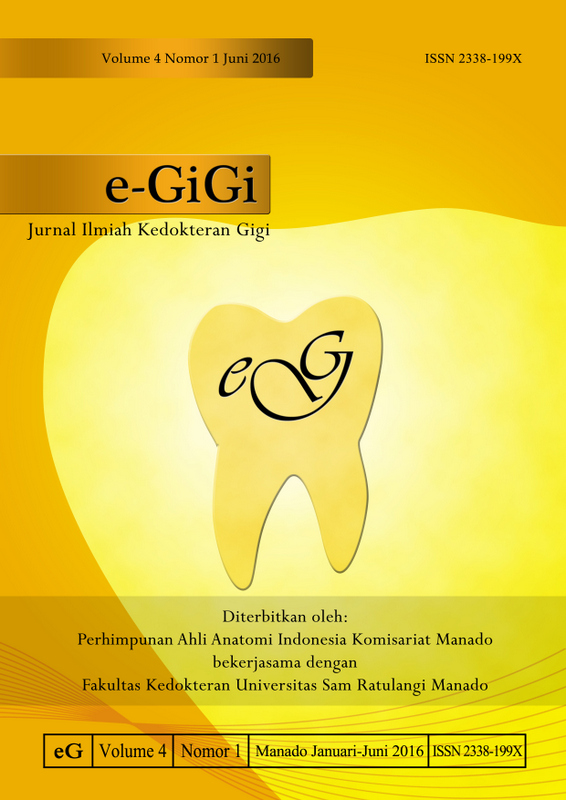Kualitas pelayanan publik dan kedisiplinan tenaga SDM di Poliklinik Gigi dan Mulut BLU RSUP Prof. Dr. R. D. Kandou Manado
DOI:
https://doi.org/10.35790/eg.4.1.2016.12315Abstract
Abstract: The quality of public services in the era of globalization and regional authority, particularly in the field of health is a priority and the demands of society. This has to be supported by human resources in health facilities as the primary important factor to fulfil the qualified health services. Issues of human resources in health facilities that need attention are less efficient, effective, and professionalism in handling health problems. The seriousness of the government to anticipate and improve the quality of public services was stated with the establishment of national policies issued as a benchmark to assess the level of Indeks Kepuasan Masyarakat in KEP/25/KEP/M.PAN/4/2004. This study aimed to analyze the relationship between the discipline of human resources and the quality of public services in the Dental and Oral Clinic of Prof. Dr. R. D. Kandou Hospital in Manado.This was a descriptive analytical study with a cross-sectional design. Samples were 80 people obtained by using purposive sampling technique. The independent variable was discipline while the dependent variable was the quality of public services. The instrument used in this study was questionnaires. The result of chi square test to analyze the relatonship between discipline and the quality of public services showed a p value of 1.000 (>0.05). Conclusion: There was no significant relationship between discipline and the quality of public services in the Dental and Oral Hygiene Clinic Prof. Dr. R. D. Kandou Hospital in Manado.
Keywords: discipline, human resources in health facilities, quality of public services
Â
Abstrak: Kualitas pelayanan publik di era globalisasi dan otonomi daerah khususnya pada bidang kesehatan merupakan prioritas dan tuntutan masyarakat. Hal ini harus didukung oleh Sumber Daya Manusia (SDM) kesehatan yang merupakan faktor penting dan penunjang utama dalam pemberian pelayanan kesehatan yang bermutu. Masalah yang perlu mendapat perhatian tentang SDM kesehatan ini ialah kurang efisien, efektif, dan profesionalisme dalam menanggulangi permasalahan kesehatan. Keseriusan pemerintah untuk mengantisipasi serta memperbaiki mutu dan kualitas pelayanan publik dengan dibentuknya kebijakan nasional yang diterbitkan sebagai tolok ukur menilai tingkat mutu yaitu Indeks Kepuasan Masyarakat (IKM) dalam Keputusan Menpan No. KEP/25/KEP/M.PAN/4/2004. Penelitian ini bertujuan untuk menganalisis hubungan antara disiplin tenaga SDM dan mutu pelayanan publik di Poliklinik Gigi dan Mulut BLU RSUP Prof. Dr. R. D. Kandou Manado. Jenis penelitian ini deskriptif analitik dengan desain potong lintang. Sampel penelitian sebanyak 80 pasien diperoleh dengan teknik purposive sampling. Variabel bebas ialah disiplin tenaga SDM di Poliklinik Gigi dan Mulut BLU RSUP Prof. Dr. R. D. Kandou Manado, sedangkan variabel terikat ialah mutu pelayanan publik. Instrumen penelitian ialah kuesioner. Hasil uji chi square untuk mengetahui hubungan disiplin dan mutu pelayanan publik mendapatkan nilai signifikansi 1,000 (>0,05). Simpulan: Tidak terdapat hubungan bermakna antara disiplin SDM dan mutu pelayanan publik di Poliklinik Gigi dan Mulut BLU RSUP Prof. Dr. R. D Kandou Manado
Kata kunci: disiplin, tenaga SDM kesehatan, mutu pelayanan publik
Downloads
Published
How to Cite
Issue
Section
License
COPYRIGHT
Authors who publish with this journal agree to the following terms:
Authors hold their copyright and grant this journal the privilege of first publication, with the work simultaneously licensed under a Creative Commons Attribution License that permits others to impart the work with an acknowledgment of the work's origin and initial publication by this journal.
Authors can enter into separate or additional contractual arrangements for the non-exclusive distribution of the journal's published version of the work (for example, post it to an institutional repository or publish it in a book), with an acknowledgment of its underlying publication in this journal.
Authors are permitted and encouraged to post their work online (for example, in institutional repositories or on their website) as it can lead to productive exchanges, as well as earlier and greater citation of the published work (See The Effect of Open Access).






